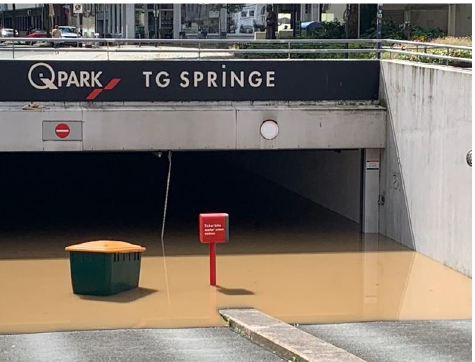Incidents & Risks
Of course, we do not wish for flooded car parks, but if flooding does occur, we have plans in place to cope. Monitoring and early warning systems alert our Q-Park Control Room (QCR) and Q-Park Operations to take appropriate action. Furthermore, some parking facilities are in areas which are prone to flooding: we categorise these as a planned risk.
Due diligence and planned risks
It’s important to know the risks to which we are exposed. Some locations, such as Q-Park Shambles, in York (United Kingdom) and three car parks in Maastricht (Netherlands) are in areas known to flood on occasion.
Natural disasters occur, so it is good business practice to be prepared.
Incident planning
Each Q-Park country assesses the risk of major incidents, including flooding, for each of the objects managed. They draw up monitoring and contingency plans, have an incident management organisation as well as recovery plans in place, so even when faced with difficulties we can deliver our quality in parking promise.
If an incident occurs, Q-Park Operations and the QCR are alerted and procedures to warn customers, season ticket holders and other stakeholders are set in motion. Affected car parks are inspected and closed for incoming vehicles if needed. In case of a flood warning, vehichles will be removed and Technical Support will remove the PMS and other equipment including cleaning machinery and company cars. The last step is to switch off the electricity.
Some locations have a moveable flood barrier at the entrances and exits and around pedestrian areas. If the flood alarm is triggered, the barrier can be raised to prevent water entering the facility and other precautions can be taken.
Multistorey car parks may also be affected, not due to flooding the parking decks, but because floodwater may mean the car park cannot be reached on foot or by car.
2021 floods tested our procedures
In recent years, Europe has had to deal with increasingly severe weather conditions and 2021 was no exception. In July 2021, when heavy rainfall caused disastrous flooding, our plans and procedures were put to the test.
As the waters in the Rhine and Meuse and their tributaries rose, people were evacuated from the affected areas. Besides power failures, there was considerable damage to homes, public property and infrastructure. Some Q-Park parking facilities were also among the objects damaged by floodwater. Three car parks in Germany (Hagen) and one in the Netherlands (Maastricht).
Figure 11 Flooded car park in Hagen, Germany

Recovery playbook
Repairing flood damage takes time. Returning to the situation before the floods will take six to nine months. And naturally, recovery is heavily dependent on the speed at which the region recovers too. Our playbook indicates that after flooding:
car parks can be opened to the public again within two weeks;
thorough cleaning takes four to six months;
replacing technical installations and repainting takes another four to six months.
